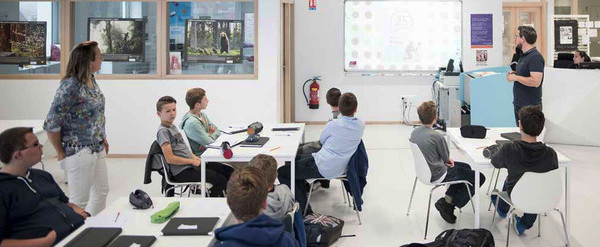The reform of the baccalaureate has introduced a new speciality teaching: " Digital and Computer Sciences " (NSI). It is one of the 19 specialty courses offered, since 2019, in Première and Terminale.
The start of the 2021 school year is the third in the première and the second in the terminale where students choose specialty courses instead of a series.
At the start of the 2021 school year, 9.6% of first-year students chose " digital and computer science " (9% in 2020). NSI is the 8th most chosen teaching, as it was in 2020. The students in the first year of the 2021 school year have changed their choices very little compared to their elders the previous year: mathematics, SES, physics-chemistry and SVT are still the most frequently chosen specialties.
At the beginning of the new school year, only 4.3% of students in their final year opted for the NSI speciality (3.7% in 2020). It is also in 8th position.
The decline in the choice of NSI courses between the first and the last year of high school is also observed for mathematics and physics-chemistry, which are decreasing in favor of economic and social sciences, history and languages.
Références :
More than half of the students in the first year of high school who took the CLF specialty drop out in their final year
In the terminale, students have to drop one of the three specialty courses taken in première. On average, the dropout rate is 33%: NSI, along with Latin-Greek and engineering sciences, are among the most abandoned specialty courses: more than 50% of students on average, at the start of the 2021 school year as in the 2020 school year.
Références :
In June 2021, France Inter looked at the various specialty courses. France Inter had collected the views of the president of the Association of Computer Science Teachers of France (AEIF), an association that emerged with the discipline and that of the Director General of School Affairs of the Ministry of Education.
difficulties of the digital discipline
According to Charles Poulmaire, NSI teacher in a high school in the Yvelines and AEIF president,
"The students take refuge in a classic choice. We are also faced with competition from other subjects because computer science, NSI, is only taught in Première, whereas all the other subjects, math, physics, SVT, are taught in collège, so the students are used to it. What is needed is to have computer science taught in the second year of high school, or even in the middle school.
According to the Director General of School Affairs, Edouard Geffray, "
The first interesting element is that we have a specialty that has burst onto the scene and has attracted almost one student in ten, with a significant increase in one year. This is the normal trajectory of a new specialty. I am not surprised that a certain number of students played it safe and took up specialties that were perhaps more identified, including by families.
Of greater concern to the director general of school affairs is the higher dropout rate for girls.
"Our female high school students are almost 60% to drop out of CLF while we are barely at 50% for boys. This means that we need to work on the image of the CLF specialty and its necessary feminization."
Five times more boys than girls in the first year of high school, 7 times more in the last year of high school
Only 18.5% of the students taking the NSI specialty in Première are girls and 13.7% in Terminale, i.e. one girl for every 5 or 7 boys respectively.
Girls are also underrepresented in math, but to a lesser extent: 40% girls in math and 47% in physics and chemistry.
Towards a target of 40% of girls in 2028 for scientific and digital education
In a report dedicated to gender equality, submitted to the Minister of Education in July 2021, Sophie Béjean, Rector of the Occitanie academic region, Claude Roiron, Ministerial Delegate for Gender Equality, and Jean-Charles Ringard, Inspector General of Education, Sport and Research, point out the under-representation of girls in scientific specialties, and more specifically in the NSI speciality course.
This " gender stereotyping " is linked by the authors of the report to the insufficient share of women among engineers in general (28%) and, in particular, among engineers in the digital sector (7%).
Among the measures for voluntarily steering gender equality policies recommended by the rapporteurs is the setting of a national target: "within three years, starting in 2022, all speciality courses, all technological series and all post-baccalaureate courses should be at least 30% co-educational, and by 2028 at least 40% co-educational in the science and digital sectors".
The authors of the report recommend, in this perspective, to "consolidate the dimension "digital humanities" in the teaching:
- or by creating an optional "Digital Humanities" course in the final cycle ;
- or by a better consideration of digital tools for humanities and digital thinking in the programs concerned;
- or by the creation of a "digital humanities" speciality course.
Référence :





